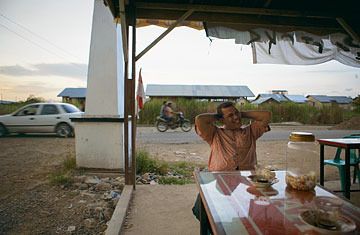
Three years after the waves took everything, Hidayat has a new business near where his former home stood
Hidayat Ali's story is one of blackest despair, and unconquerable hope. In late December 2004, the native of Banda Aceh, the capital of Indonesia's Aceh province, withdrew his life savings from the bank — a $40,000 cash payment on a new shop. A few days later, Hidayat was out with his family when he heard news of an earthquake. He rushed home to drop off his family, then went to check on a friend on the other side of town. Minutes later, the waves struck, washing away everything Hidayat held dear: his wife and two children, his house and every cent he ever earned. Some 167,000 Acehnese were killed by the great tsunami of Dec. 26, 2004, far more than anywhere else.
"Lots of people haven't been able to get over what they lost in the tsunami," says Hidayat, a stocky 46-year-old with a square jaw and flat-top hairstyle. Yet, just over three years on, Hidayat has managed to pull his life together, remarrying and starting a small coffee stand near the capital's main port with seed money from an aid organization. Like Hidayat, too, the province is feeling its way back to normalcy. Pipes for clean water are being laid, swampland converted into shrimp farms, and hotels built for aid workers remaining in the area.
There's still much to do. Social services are woefully underdeveloped, there's too much dependency on foreign aid, and potential Western investors worry both about renewed separatist violence and the introduction of strict Islamic law. Funding for improvement projects has come slowly, allowing resentment to fester. Roads remain badly damaged, while some areas, such as the district of Aceh Jaya, still don't have hospitals. "If a woman needs a C-section she will probably die in childbirth while making the trip to Banda Aceh," says Lynette Johnson, an Australian aid worker. The provincial government says it is aware of people's grievances. "The donors have helped us build our economy," says vice governor Muhammad Nazar. "But we hope the Acehnese have not become too dependent on their projects so that when they leave the impact will not be too strong."
Hidayat Ali's resilience is a hopeful indicator. Back at his Banda Aceh coffee stand, Hidayat grumbles that he will soon have to make way for a new road being built to the port. "I'm not sure what's going to happen, but it couldn't be any worse than what I've been through," he says, taking a drag on a slow-burning clove cigarette. "I survived before. I am sure I will again."
